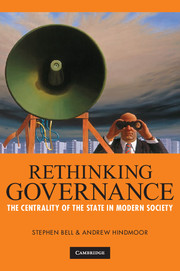Book contents
- Frontmatter
- Contents
- Figures and tables
- Preface
- 1 A state-centric relational approach
- 2 The resilient state
- 3 Metagovernance and state capacity
- 4 Hierarchy and top-down governance
- 5 Governance through persuasion
- 6 Governance through markets and contracts
- 7 Governance through community engagement
- 8 Governance through associations
- 9 Conclusion
- Notes
- Bibliography
- Index
8 - Governance through associations
Published online by Cambridge University Press: 05 June 2012
- Frontmatter
- Contents
- Figures and tables
- Preface
- 1 A state-centric relational approach
- 2 The resilient state
- 3 Metagovernance and state capacity
- 4 Hierarchy and top-down governance
- 5 Governance through persuasion
- 6 Governance through markets and contracts
- 7 Governance through community engagement
- 8 Governance through associations
- 9 Conclusion
- Notes
- Bibliography
- Index
Summary
Associative governance occurs when governments or state agencies form governing partnerships with societal organisations or NGOs. In this chapter we explore associative governance in two loosely categorised forms: corporatism, where governments jointly make and implement public policy in cooperation with major interest associations; and private-interest government, where governments or state agencies sanction or encourage the use of private authority in governance arrangements. A good example of corporatism is when governments formally negotiate with labour associations to establish and jointly implement wage moderation policies in a national economy. An example of private-interest government is when governments allow firms or business associations to set codes of practice or self-regulate their activities in certain sectors.
Political scientists have always debated how influential interest-groups are within the policy process and how defensible that influence is. Two contrasting positions are offered by pluralists and public choice theorists. Although tracing its intellectual origins back to John Locke's theory of consent and Montesquieu's 18th-century celebration of the separation of powers, pluralist theory was developed mostly by American political scientists in the 1950s and 1960s. At the core of pluralist theory is a belief that power ought to be dispersed throughout society; that public participation in political processes should be encouraged; and that government policy should command the consent of the public. Pluralists have argued that interest-groups enhance the democratic process because they limit the power of the state by checking and balancing any excessive concentrations of political power that may arise (Truman, 1951; Dahl, 1956).
- Type
- Chapter
- Information
- Rethinking GovernanceThe Centrality of the State in Modern Society, pp. 162 - 185Publisher: Cambridge University PressPrint publication year: 2009



